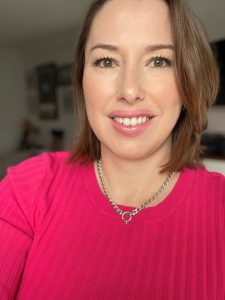Jenny is an audiologist at our Buderim clinic. She worked at Neurosensory for 5 years before taking a year off to help develop a telehealth start up for tinnitus and hyperacusis care for veterans.
She has recently come back to Neurosensory to keep building on her specialties which are tinnitus, hyperacusis, misophonia, cochlear implants, bone conduction implants and rehabilitation.
Tell us a bit about yourself
I am the proud ‘pawrent’ of two naughty mini schnauzers. My hobbies include aerial arts, and my favourite activities include lyra, silks, hammock and trapeze.
What made you get into audiology?
I grew up with speech pathology delays where reading and writing was more difficult, so I have always been geared towards sound, imagery and music being more meaningful to me. It’s why I originally ended up in film. Film was enriching for my creative soul, but I didn’t feel I was helping others or necessarily making the world a better place. So, audiology seemed like a good cross section of creativity but also meaning and helping people.
What is your favourite part of your job?
I help to make people’s lives better. I’m with them for a long time from when they start having concerns to seeing them thrive and at times, helping them through some very challenging obstacles. I think it’s an important support system we play to keeping people socially engaged.
What is the most challenging part of your job?
One of the more significant challenges is the limited opportunity to connect with a broader network of medical professionals who have a shared interest in tinnitus. Ideally, I’d love to regularly collaborate with ENTs, dentists, physiotherapists, psychologists, and pain specialists to support more complex cases, but those interdisciplinary opportunities can be hard to come by.
If you weren’t an audiologist, what would you be?
I’d probably be doing something completely different , like owing a pottery studio or music recording studio.
What are you most excited about in the future of audiology.
The uptake of telehealth. So many people live in inaccessible parts of the country or live hours from an audiology clinic. I think the access that has been created by Advanced Bionics for synchronous cochlear implant mapping is an absolute game changer for many people living in rural areas or those with mobility issues who are unable to drive to take back their independence.
